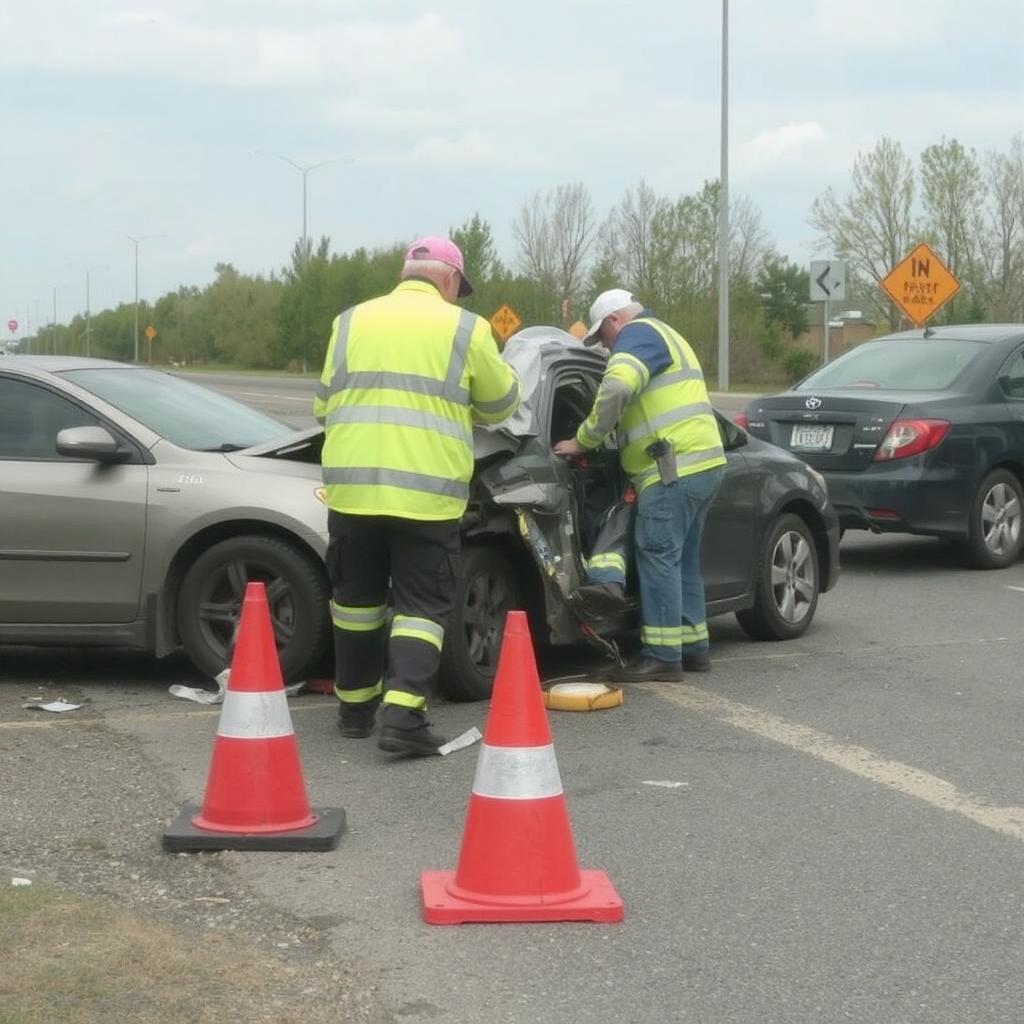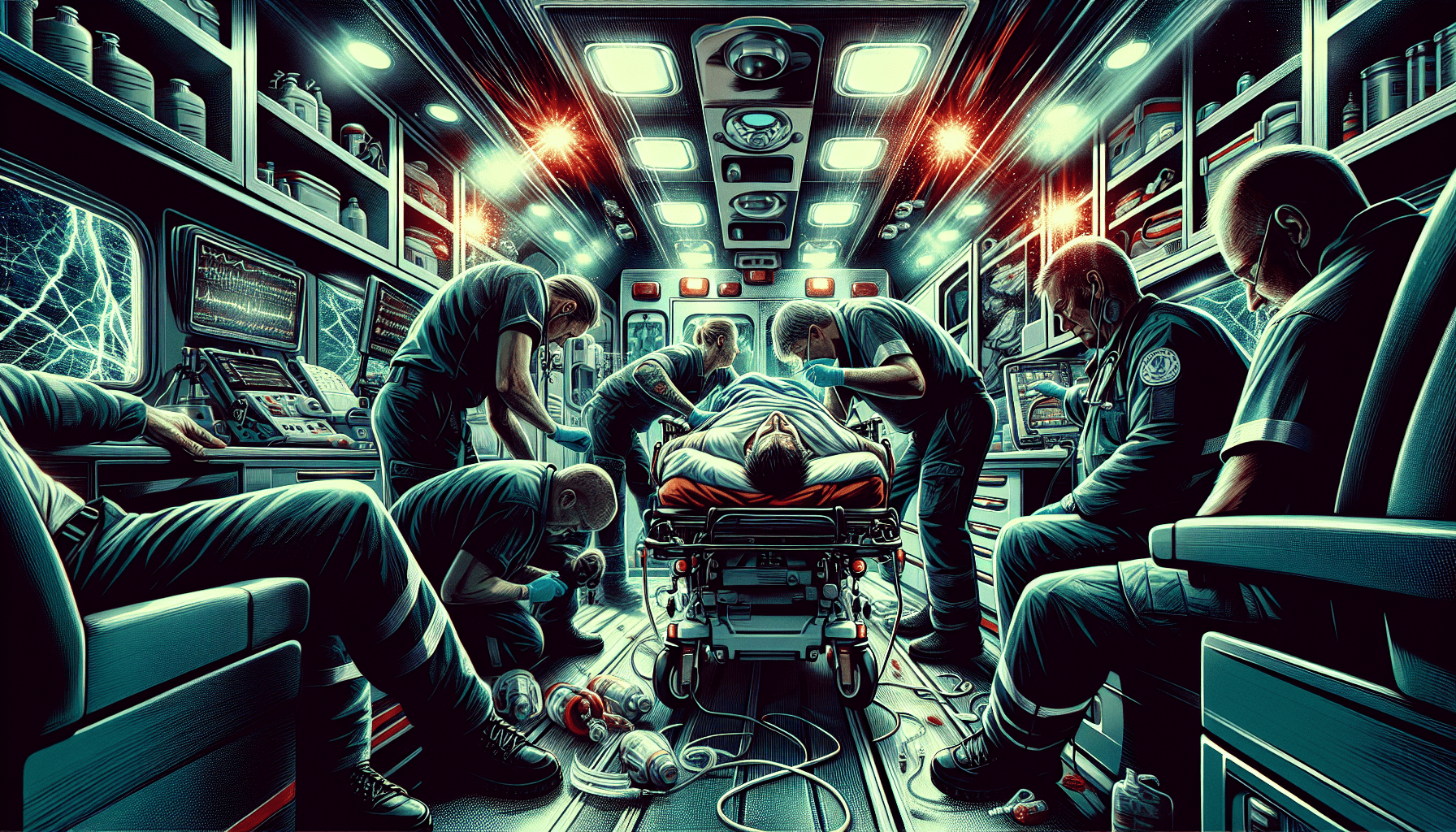
I just had a car accident and am not sure what to do next. This guide will give you the essential steps on what to do after a car accident, ensuring your safety and helping you navigate the aftermath.
Key Takeaways
- Prioritize safety and well-being after a car accident by checking for injuries, moving to a safe location, and calling emergency services as necessary.
- It is crucial to document the accident scene with photos, gather essential information from all drivers involved, and obtain a police report for a smoother insurance claims process.
- Seek medical attention promptly, notify your insurance company without delay, and understand your insurance policy details to ensure adequate coverage and claims support.
Ensure Safety and Well-being
Immediately after a car accident or auto accident, focus on the safety and well-being of everyone involved. First, check yourself and your passengers for any injuries. Call 911 immediately if anyone is injured. Adrenaline can mask pain, so assess the situation calmly and thoroughly. In the aftermath of car accidents and auto accidents, it is crucial to remain composed.
If it is safe to do so, move your vehicle away from traffic to avoid further accidents. Activate your emergency flashers to alert other drivers. On busy roads, it’s wise to stand a few car lengths behind your vehicle to stay out of harm’s way. If your vehicle is in a dangerous position and can’t be moved, leave it where it is and get yourself and others to a safe area. At night, flares or reflectors are used to enhance visibility and secure the accident scene.
These precautions keep you and your passengers safe and help emergency responders locate and assist you more efficiently. Always remember that your safety is paramount, and taking these steps can prevent further harm.
Call the Police
After ensuring everyone’s safety, it is crucial to alert the police. In several states, you’re legally obligated to report an automobile accident if there are significant injuries or extensive property damage. The responding officers will record their findings at the scene and produce a formal accident report—a vital document for your insurance claim as well as legal defense.
Upon their arrival, law enforcement officials will compile critical details such as contact information of all drivers involved in the collision and their vehicle insurance specifics and render an initial determination regarding the fault. This official account crafted by the police is indispensable in safeguarding you against wrongful claims or disagreements that may arise later on. Lacking this documentation can present obstacles during the insurance claim process and potentially lead to legal consequences should there be a failure to report the incident.
An accurate police report plays a pivotal role in establishing who was at fault while offering concrete evidence concerning what transpired before the impact occurred. Possessing this type of authoritative support helps immensely not only with your insurance company but also ensures equitable treatment when resolving matters related to the crash.
Exchange Information with Other Drivers Involved
After notifying the police, information was exchanged with the other driver involved in the accident. This is vital for the insurance claims process and any potential legal proceedings. Make sure to record the full names, contact details, insurance providers, policy numbers, driver’s license numbers, and vehicle plate numbers of all drivers involved. Also, gather information about the type, color, and model of the other vehicles.
Avoid admitting fault or making any promises regarding payment at the scene, as this can complicate the claims process. It’s best to stick to the facts and let the insurance companies determine liability. Additionally, collecting contact information from any witnesses can be beneficial.
Thoroughly documenting this information ensures you have all the necessary details to support your case and facilitate a smoother claims process. Remember, clear and accurate records are your best defense in the event of disputes.
Document the Accident Scene
Thoroughly recording the details of an accident scene is crucial for bolstering your insurance claim. By taking photos and videos, you can provide concrete proof that illustrates both what happened and the damage caused. It’s important to photograph the position of each vehicle involved, current weather conditions, roadways, traffic signage in place, and any injuries or vehicular damage.
To capture visual evidence at the scene of an accident, it’s essential to compile comprehensive notes concerning various aspects such as time and date specifics alongside accounts from others present during the incident. This step assists in maintaining a solid record which could prove beneficial when trying to substantiate claims about how events transpired leading up to impact.
Having detailed documentation plays a significant role not only in figuring out who was at fault, but also aids immensely throughout every stage of navigating through your insurance claim process by strengthening your case with irrefutable facts regarding the mishap – something that might be indispensable should there be subsequent legal action.
Seek Medical Attention
It is essential to obtain medical care following a car accident, regardless of whether you believe yourself to be unharmed. The rush of adrenaline during such an incident can obscure the true extent of your injuries. Delayed symptoms are characteristic of conditions like whiplash, concussions, and internal bleeding. It’s important to have a healthcare professional assess any concealed damages.
Ensure that all treatment records and costs related to medical care are meticulously recorded as this evidence is vital when pursuing an insurance claim. Keeping detailed documentation will bolster your position throughout the insurance claim process by demonstrating the nature of your injuries and corroborating any claims for compensation due to lost wages or other impacts stemming from the accident.
Notify Your Insurance Company
Immediately following the resolution of any urgent safety and health issues, it is crucial to contact your insurance company about the accident without delay. Most insurance policies stipulate that you must report incidents as soon as possible to guarantee efficient handling of your claim. Failure to swiftly inform them can lead to complications in navigating the claims process and may put your entitlements at risk.
Communicate comprehensively with your insurance agent regarding details surrounding the accident, such as injuries incurred and how events unfolded. For all related insurance claims, maintain a record of medical consultations along with a physician’s documentation evidencing injury evaluations and treatments received. Visiting a healthcare professional within 72 hours post-accident strengthens support for your claim by showcasing immediate action toward addressing potential harm sustained.
Once you’ve initiated a claim, an adjuster from your insurance company will be tasked with examining both damage incurred by the vehicle and determining who was at fault, along with estimating the repair expenses involved. Furnishing proof that includes relevant documentation combined with confirmation of up-to-date premium payments helps bolster credibility during this phase, thus ensuring expeditious advancement through each step of this procedure.
Understand Your Insurance Policy
It is crucial to comprehend the specifics of your insurance policy following an accident. Examine your coverage, including what’s covered, the limits of each section, and any applicable deductibles, before lodging a claim. For a concise overview of your various coverages and their corresponding limits, refer to the Declarations Page within your policy.
Liability coverage Covers both bodily injury and property damage liability expenses if you’re deemed responsible for causing an accident. If there is vehicle damage due to a collision with another object or car, that’s where collision coverage comes in. On the other hand, comprehensive coverage addresses damages not related to collisions. Medical costs are typically addressed by either Personal Injury Protection (PIP) or Medical Payments (MedPay), with PIP offering benefits regardless of who was at fault in the incident.
Be aware that policy limits establish how much payment will be made by your insurer for different claims under those policies. It’s also important to understand any exclusions indicated on your insurance plan which detail specific scenarios or items that aren’t included under its protection umbrella.
Repairing or Totaling Your Vehicle
Deciding whether to repair or total your vehicle is a key consideration after an accident. A vehicle is deemed a total loss if the repair costs exceed a certain percentage of its value, commonly around 60%. Insurance settlements for totaled cars are based on their actual cash value, which accounts for depreciation.
To ensure a fair settlement, research your vehicle’s market value and compare multiple estimates. If you believe the total loss declaration is incorrect, you can dispute it with your insurance company.
If you decide to keep a totaled vehicle, you will need to obtain a salvage title to legally drive it. Knowing these options helps you make informed decisions and ensures you receive appropriate compensation for your vehicle.
Legal Assistance
It is critical to secure legal support in situations where there’s a dispute regarding who is at fault or how much compensation is due. Documenting the scene of the accident through comprehensive photography and videography strengthens your personal injury claim substantially. For those experiencing difficulties with their claims or confronting intricate legal hurdles, enlisting guidance from a seasoned attorney can be profoundly impactful.
With expertise in managing cases stemming from car accidents, Weiskopf Law offers specialized assistance and advocacy you may require. Our professionals are equipped to steer you adeptly through every step of the claims process, helping to secure just recompense for your experience.
Keep Records and Follow Up
Detailed records and follow-ups are essential for supporting your claims. Maintain an accident journal to document personal experiences, symptoms, and any developments related to the accident. This can be vital for your injury claim and provide strong evidence for your case.
Collect and organize all relevant documents, including medical bills, car repair estimates, and receipts. Detailed witness statements can also significantly bolster your claim by corroborating your version of events.
Why Jeffrey Weikopf, P.C. Is The Best Lawyer For You
In the event that you or someone close to you has sustained injuries from a car accident, or if there has been a loss of life within your family due to another individual’s carelessness, it is crucial to seek legal counsel. Jeffrey Weiskopf, P.C. provides professional legal services aimed at obtaining the compensation you are entitled to. To start on the path towards reclaiming your dues, reach out and arrange a no-cost consultation by calling their office at 914-350-5175.
You can find us poised for action at 30 State St., Suite 2B in Ossining, NY 10562, where we stand ready to guide you and support you through every phase of navigating your car accident claim. Our unwavering commitment, coupled with their considerable knowledge, firmly establishes us as an exemplary option when selecting representation for your case related to automobile accidents.
Summary
This overview presents crucial actions to take following a car accident, offering detailed guidance for coping with the difficult consequences. It emphasizes important measures such as prioritizing safety, notifying the police, comprehending your insurance policy details, and obtaining legal help in order to safeguard your interests and facilitate recuperation.
Adhering to this advice can greatly assist in organizing amidst disorder while also preparing you for future dealings with insurance claims and any necessary legal processes. Correct post-accident procedures are vital for acquiring adequate compensation and aid that will support you through recovery.
Frequently Asked Questions
What should I do immediately after a car accident?
Immediately after a car accident, prioritize safety by ensuring everyone is unharmed, calling 911 if there are injuries, moving your vehicle to a safe location, and activating your emergency flashers.
These steps are crucial for your protection and to prevent further incidents.
Why is it important to call the police after a car accident?
It is important to call the police after a car accident to ensure an official accident report is created, which is essential for processing insurance claims and providing legal protection.
What information should I exchange with other drivers involved in an accident?
You should exchange full names, contact details, insurance providers and policy numbers, driver’s license numbers, and vehicle plate numbers with other drivers involved in the accident.
This exchange of information is crucial for processing claims and ensuring proper communication.
Why should I seek medical attention even if I feel fine after an accident?
It is essential to seek medical attention after an accident, even if you feel fine, as adrenaline can mask injuries, and symptoms may not appear until later.
A medical evaluation helps identify and document any hidden injuries that could have lasting effects.
How can Jeffrey Weiskopf, P.C. help me after a car accident?
Suppose you have been involved in a car accident and suffered injuries or damages. In that case, Jeffrey Weiskopf, P.C. is equipped to provide professional legal counsel to secure the full compensation entitled to you.



